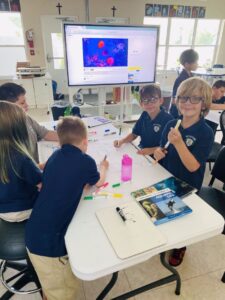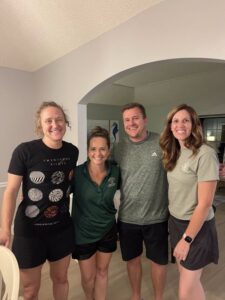
VERO BEACH, Fla. – For eight years, Danielle McLean couldn’t believe her luck. Through all of pre-school and elementary school, her twin boys Jackson and Lincoln, both on the autism spectrum, had only three teachers. Two were Teacher of the Year finalists in their east Central Florida school district, and all of them, McLean believed, were exceptional.
So, when it came time for middle school, McLean was distraught. She was not hearing good things about where her boys were headed. And at a meeting last October to discuss next steps, two of their teachers weren’t optimistic either. “I’m almost in tears,” McLean recalled. “I’m like, ‘Where should I go?’ “
One of the teachers, Ryan Sandgren, wasn’t sure where he was going either. He had his own frustrations with the system. He told McLean, “If you created something, we are willing to be creative with you.”
McLean got the hint. That night she asked, “Alexa, how do you start a school?”
McLean did not start a “school.”
But last month, she, Sandgren, the other teacher at the meeting, Jessica Geary, and Megan Knowles, a speech language pathologist, opened the nonprofit Keystone Education Center.
Keystone is a full-time tutoring operation for students in grades three through seven that focuses on life skills, job skills, and academics. It uses 1,600 square feet of space in a church. It serves 17 students, including 16 on the autism spectrum and many with attention-deficit/hyperactivity disorder, also known as ADHD.
All of them use the Family Empowerment Scholarship for Students with Unique Abilities, a state-funded education savings account administered by Step Up For Students.
It’s the funding and flexibility of those ESAs that allowed the foursome to create the learning model they wanted.
“The whole journey has been this pinch-me-I-can’t-believe-this-is-happening,” said McLean, who was briefly a public school teacher herself.
“It was always like a dream, to have a school to help students in need, to have more control and input” into how education should be done, said Sandgren, who worked in public schools for eight years. “You look around and you’re like, ‘I can do this.’ If you have the right team, you can.”

Founders from left to right, Jessica Geary, Danielle McLean, Ryan Sandgren, and Megan Knowles. Courtesy of Keystone Education Center
The story of Keystone Education Center underscores so many distinctive subplots happening in Florida, the most choice-rich state in America.
For one, it’s not a school. That’s significant because as Florida leads the nation in the transition from school choice to education choice, more diverse options like tutoring centers, hybrid homeschools, and a la carte providers are on the rise.
The teacher empowerment angle is key, too. The former public school teachers who co-founded Keystone join a growing list of teachers who are finding choice is giving them the power to create what they think is best, rather than submit to bureaucracies they find smothering. A number of them are creating options, like this one and this one and this one, that are specifically for students with special needs.
Sandgren comes from a family of public school educators. He said he’s always been passionate about helping students with special needs develop their talents. But sometimes, in traditional settings, obstacles creep into the way, like, in his view, too much emphasis on standardized testing, or classes with such a wide variety of special needs, no student truly gets the instruction they need.
“There came a breaking point,” he said.
Keystone is also another good example of the barriers that continue to challenge education entrepreneurs even when robust choice programs are in place.
The founders had no problem attracting families who wanted an alternative to traditional schools. “I didn’t need to do a market analysis,” McLean said. “I knew there was a gap for kids like mine.”
But finding a building that was affordable and accessible? Different story.
McLean said the pickings were so slim, the founders considered signing a lease for a building that would have cost $8,000 a month. Fortunately, McLean was relentless in reaching out to local pastors. and one of them offered church space for a fraction of that cost.
Keystone’s founders plan to add a grade a year through high school. They’re emphasizing small class sizes, best practices from applied behavioral sciences, and character development to nurture lifelong learners who can “thrive beyond the classroom as kind, contributing citizens.”
“We want to make learning applicable to real life,” Sandgren said.
The center’s schedule reflects those goals.
Mondays are for recreational activities and social clubs. The founders wanted to make sure students eased into the week and started on a joyful note.
Tuesdays, Wednesdays, and Thursdays are for core academics.
Fridays are for field trips. Publix, the movie theater, the bowling alley – anywhere, McLean said, where community-based instruction can help students work on functional skills.
Geary, who worked in public schools for 10 years, said she’s grateful for Florida’s choice programs and what they’re allowing her to do as an educator.
Having meaningful input into core components like curriculum and scheduling and assessment is a pleasant contrast to the dynamic in district schools, she said. Recently, the team at Keystone called a local business that offers sailing lessons to see if it could accommodate Keystone students on a field trip. (The answer was yes.)
“I could never do something like that at the district,” Geary said.
The rush of creating your own option, she continued, is “better than I ever though it could be.”